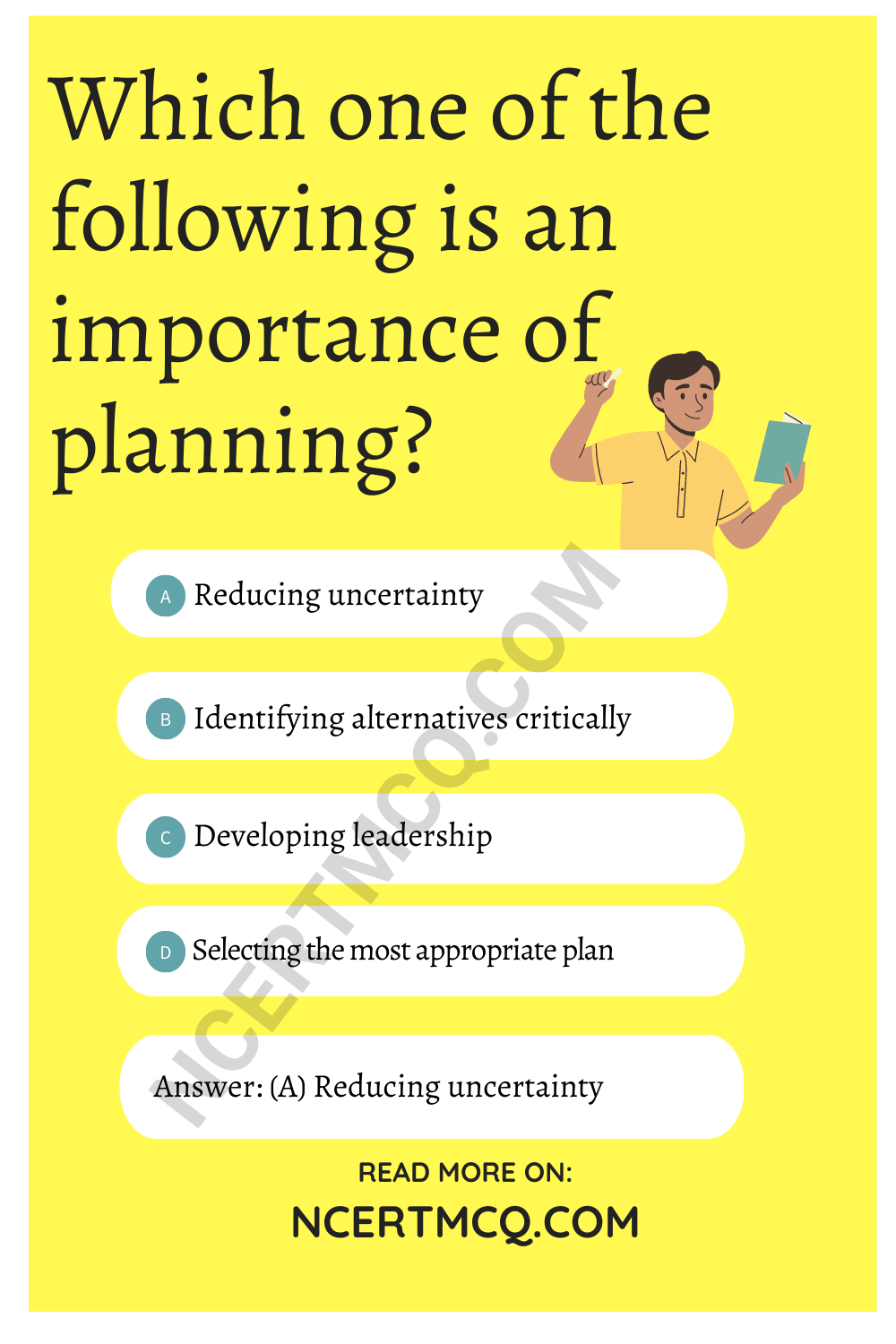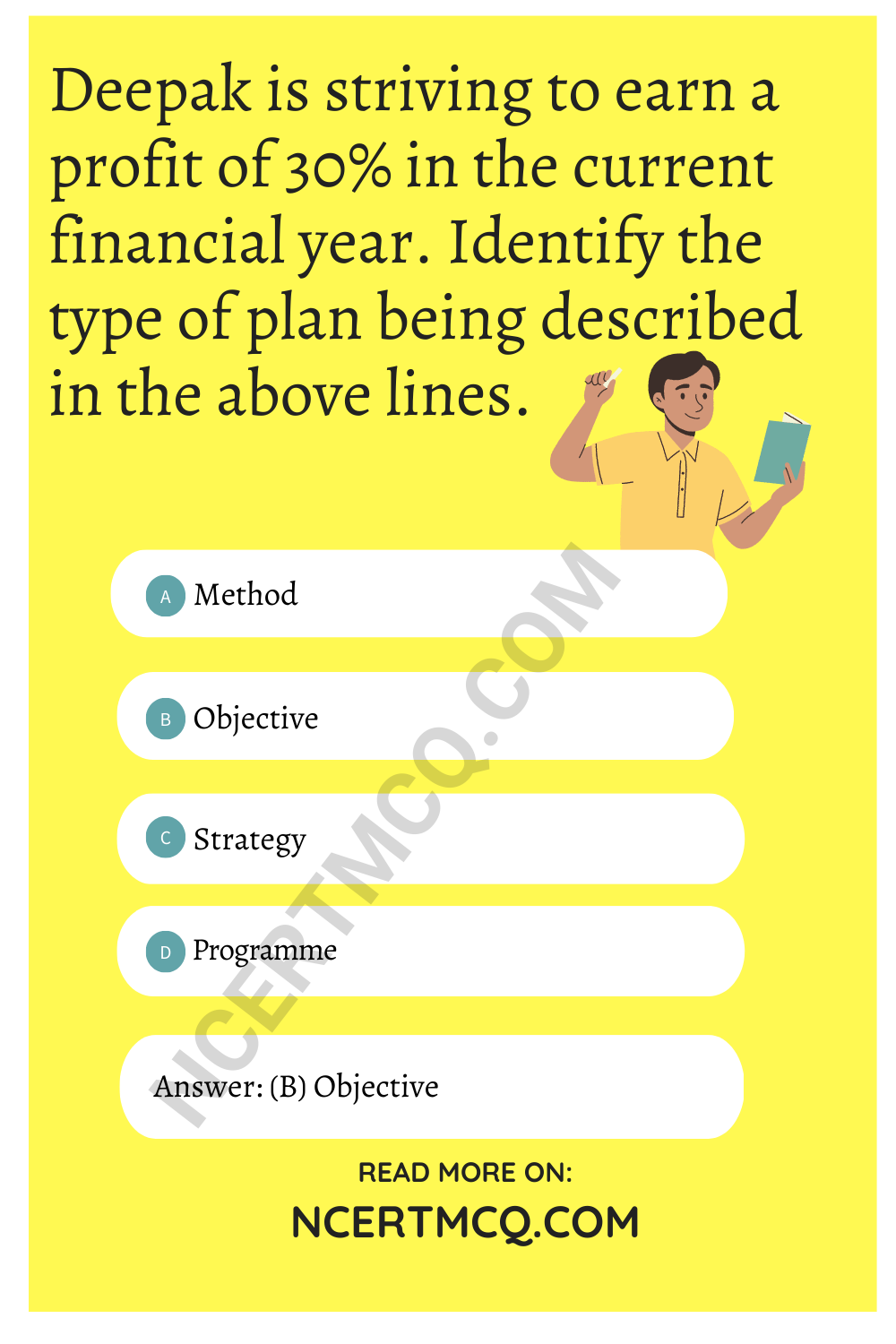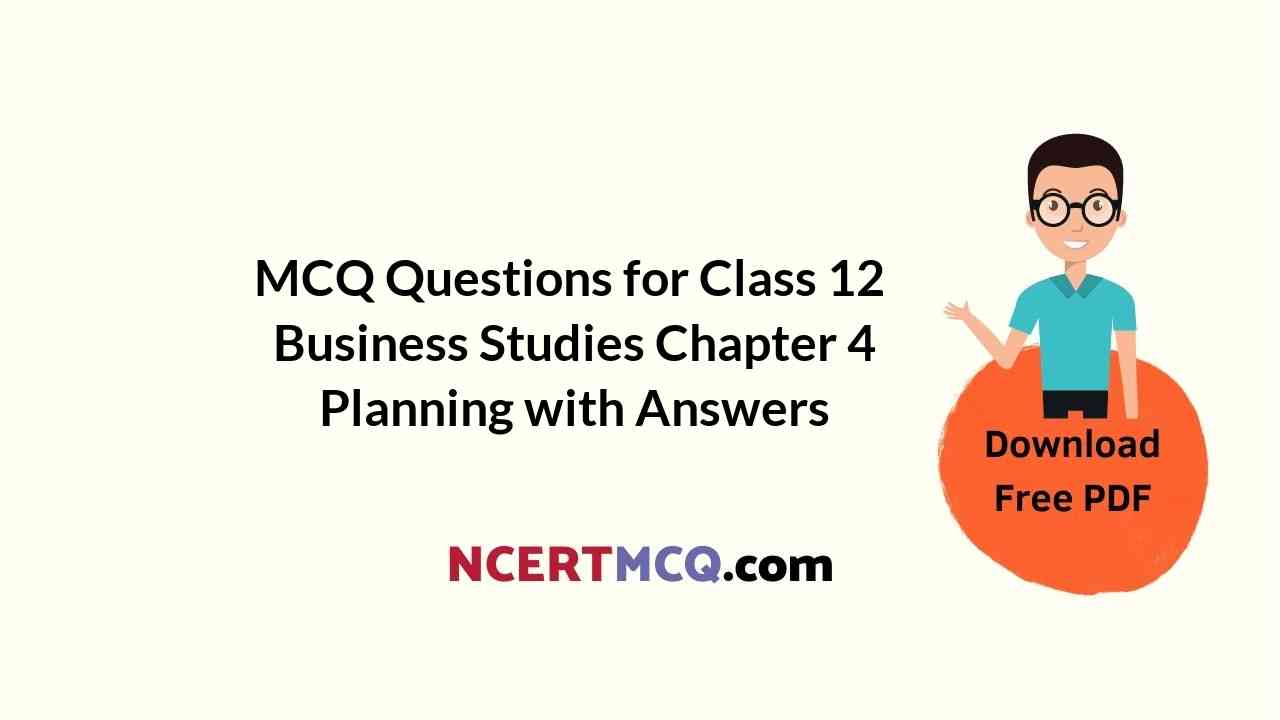Check the below NCERT MCQ Questions for Class 12 Business Studies Chapter 4 Planning with Answers Pdf free download. MCQ Questions for Class 12 Business Studies with Answers were prepared based on the latest exam pattern. We have provided Planning Class 12 Business Studies MCQs Questions with Answers to help students understand the concept very well.
Class 12 Business Studies Chapter 4 Planning MCQ With Answers
Business Studies Class 12 Chapter 4 MCQs On Planning
Planning Class 12 MCQ Question 1.
Pervasiveness of planning indicates that planning
(a) is a top management function.
(b) extends throughout the organisation.
(c) is a future-oriented activity.
(d) is the first element of management process.
Answer
Answer: (b) extends throughout the organisation.
Planning MCQ Question 2.
Which one of the following is an importance of planning?
(a) Reducing uncertainty
(b) Identifying alternatives critically
(c) Developing leadership
(d) Selecting the most appropriate plan
Answer
Answer: (a) Reducing uncertainty

Planning MCQs Class 12 Question 3.
Which one of the following is not a limitation of planning?
(a) Dynamic environment
(b) Costly process
(c) Rigidity
(d) Top management approach
Answer
Answer: (d) Top management approach
Question 4.
Which one of the following is a step of planning?
(a) Analysis of organisation structure
(b) Analysis of environment
(c) Analysis of employee behaviour
(d) Analysis of employee morale
Answer
Answer: (b) Analysis of environment
Question 5.
The basic role of strategy is to provide
(a) setting procedures.
(b) direction for action
(c) direction for motivation.
(d) direction for control
Answer
Answer: (b) direction for action
Question 6.
Which one of the following plans prescribes chronological steps for performing activities?
(a) Procedure
(b) Rule
(c) Policy
(d) Method
Answer
Answer: (a) Procedure
Question 7.
Which one of the following is a single-use plan?
(a) Strategy
(b) Rule
(c) Budget
(d) Method
Answer
Answer: (c) Budget
Question 8.
Decision-making is the case of __
(a) Planning
(b) Organising
(c) Staffing
(d) Directing
Answer
Answer: (a) Planning
Question 9.
__ is a statement of expected results in numerical terms.
(a) Forecast
(b) Budget
(c) Plan
(d) Estimate
Answer
Answer: (b) Budget
Question 10.
___ is a feature of planning also referred to as primacy of planning.
(a) Pervasive
(b) Primary function of management
(c) Continuous
(d) Integrating
Answer
Answer: (b) Primary function of management
Question 11.
___ is a comprehensive plan for achieving its objectives.
(a) Strategy
(b) Method
(c) Rule
(d) Policy
Answer
Answer: (a) Strategy
Question 12.
___ is the type of plan which is time-bound and linked with measurable outcome.
(a) Strategy
(b) Policy
(c) Rule
(d) Budget
Answer
Answer: (d) Budget
Question 13.
___ is a standardised way or manner of performing a routine activity considering its objectives.
(a) Procedure
(b) Method
(c) Rule
(d) Programme
Answer
Answer: (b) Method
Question 14.
___ specifies the end to be achieved.
(a) Objective
(b) Strategy
(c) Policy
(d) Method
Answer
Answer: (a) Objective
Question 15.
___ are relevant to recurring activities.
(a) Single-use plans
(b) Standing plans
(c) Objectives
(d) Programmes
Answer
Answer: (b) Standing plans
Question 16.
In 2019 alone, Swiggy has launched operations in 300 towns and cities. Swiggy follows a two-step sequence while expanding to a small town. First, it provides more laborious training to restaurants and delivery partners compared to their counterparts in the city. Second, it focuses on building scale in operations and increase the restaurant’s reach to a larger base of consumers, including optimizing kitchens, resource planning among others. Identify the type of plan being described in the above lines.
(a) Method
(b) Strategy
(c) Programme
(d) Procedure
Answer
Answer: (b) Strategy
Question 17.
Deepak is striving to earn a profit of 30% in the current financial year. Identify the type of plan being described in the above lines.
(a) Method
(b) Objective
(c) Strategy
(d) Programme
Answer
Answer: (b) Objective

Question 18.
Ketan Enterprises adopts different ways to provide training to employees, like Job . Rotation, Coaching, Vestibule Training, Conference, Lecture Method and Role Playing. Identify the type of plan being described in the above lines.
(a) Method
(b) Strategy
(c) Programme
(d) Procedure
Answer
Answer: (a) Method
Question 19.
The government has been doubling down on its efforts to switch to 100% electric vehicles by 2030. Many companies such as Tata Motors, Kinetic Motors, Maruti Suzuki and Hyundai Motors are all readying their EV models for a 2020 launch in order to support the plan. Identify the type of plan being described in the above lines.
(a) Method
(b) Strategy
(c) Programme
(d) Objective
Answer
Answer: (b) Strategy
Question 20.
Based on National Common Mobility Card standards, India’s first indigenously developed inter-operable transport card was launched in March 2019 to make travel across various modes convenient. Identify the type of plan being described in the above lines.
(a) Strategy
(b) Programme
(c) Method
(d) Rule
Answer
Answer: (a) Strategy
True or False
State with reasons whether the following statements are True or False.
1. Rule is a specific statement that prescribes what is to be done or not to be done.
Answer
Answer: True; rule sets the conditions which must be observed in performing various activities.
2. Rule is the prescribed way or manner in which a task has to be performed considering its objectives.
Answer
Answer: False; method is the prescribed way.
3. Identifying alternative courses of action is a step in organising process.
Answer
Answer: False; it is a step in the planning process.
4. Method is a chronological sequence in which an activity should be performed.
Answer
Answer: False; procedure is the chronological sequence in which an activity should be performed.
5. The last step in the process of planning is “Plan Implementation.”
Answer
Answer: False; follow-up action is the last step.
6. Planning premises are the actual plans about the future organisational resources.
Answer
Answer: False; planning premises are the assumptions about future environmental scenario and organisational resources.
We hope the given NCERT MCQ Questions for Class 12 Business Studies Chapter 4 Planning with Answers Pdf free download will help you. If you have any queries regarding Planning CBSE Class 12 Business Studies MCQs Multiple Choice Questions with Answers, drop a comment below and we will get back to you soon.
Class 12 Business Studies MCQ:
- Nature and Significance of Management Class 12 MCQ
- Principles of Management Class 12 MCQ
- Business Environment Class 12 MCQ
- Planning Class 12 MCQ
- Organising Class 12 MCQ
- Staffing Class 12 MCQ
- Directing Class 12 MCQ
- Controlling Class 12 MCQ
- Financial Management Class 12 MCQ
- Financial Markets Class 12 MCQ
- Marketing Management Class 12 MCQ
- Consumer Protection Class 12 MCQ
- Entrepreneurship Development Class 12 MCQ
